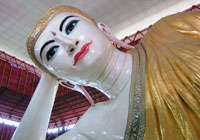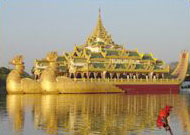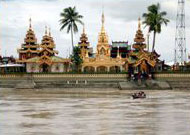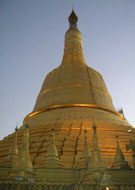|
|
 |
|
 |
|
YANGON & ENVIRONS
 Yangon (Literally meaning End-of -Strife) is the
economic city of
Myanmar as well as the gateway to Myanmar. It lies 34 kms
upriver from the Gulf of Mottama (Mataban). It is a gracious
once-colonial city, laid out in a conventional "colonial grid"
pattern resembling a chessboard, planned by the British city
planners.
Yangon is proud of the towering gold-crusted Shwedagon Pagoda,
which is best known for its grandeur and awe-inspiring
greatness. Described by Rudyard Kipling as "a beautiful,
winking wonder," Shwedagon Pagoda is the one of the most
magnificent monuments on earth. It is said to have been built
over 2,500 years ago and Four Relics of the FOUR BUDDHAS are
enshrined in it. The Pagoda is covered with 60 tons of pure
gold and Its Umbrella or Tip is set with diamonds, rubies,
sapphires and emeralds. Other places of interest are the Sule
Pagoda, the Kaba aye (World Peace) Pagoda, Chauk-Htat-gyi
Pagoda, National Museum and Colonial Buildings.
Many old colonial style buildings are still standing in
YANGON, many of which are now occupied by government offices.
The City Hall is one of the grandest, an impressive stone
structure with classical colonial style and integrated with a
Myanmar touch. The Supreme Court, High Court, General Post
Office, Strand Hotel, Port Authority Building, Custom House
and Railway Administrative Building are also magnificent
remembrances of the bygone era.
HIGHLIGHTS
 Shwedagon Pagoda Shwedagon Pagoda
It is said to have been built nearly 2600 years. It is built
on a small hill and said to be enshrined of eight hairs of the
last Buddha and other relic of three preceding Buddha.
Described by Rudyard Kipling as " a beautiful, winking
wonder", Shwedagon is a must to go and marvel the golden dome
glittering with lights as the sunset.
Botahtaung Pagoda
Located on the Yangon river front, Botataung Pagoda is said to
house a hair and two other relics of the Buddha. The
glasshouse inside the Pagoda displays many of the ancient
relics and artifacts which were originally enshrined inside
the stupa.
Chaukhtatgyi Reclining Buddha
It is a home to a 17.6 meter high and 65.8 meter long
reclining Buddha, which is larger than the one in Bago. There
are some astrologers on its southern stair side plus some
woodcarving stalls.
Sule Pagoda
When Yangon was first built it is said that Sule was laid out
at the middle in a conventional "colonial grid" pattern city.
It is an octagonal-shaped Pagoda towering above 48 meters.
Being in a city centre Sule is a refuge of all passer-bys.
Kandawgyi Lake
Locate north of downtown Yangon is the Kandawgyi Royal Lake.
It is a pleasant place to walk about and you can find many
local restaurants including luxurious Kandawgyi Palace hotel.
Dinning at the floating Karaweik restaurant while enjoying
traditional Myanmar dance is one of Yangon's most memorable
experience.
Bogyoke Aung San (Scott) Market
It is probably the most famous market of Yangon where you can
find varieties of products, be they local or foreign. Many a
travelers love to go there to buy souvenirs like traditional
Sarong, Shan shoulder-bag or precious and famous Myanmar gem.
Generally, the prices may be a slightly high there as it is
known as the market of the cream of society. Nevertheless you
shouldn't miss to go and hunt for your souvenirs there.
National Museum
Probably the biggest museum of its kinds and well worth a
visit. It houses the royal regalia of the former Myanmar Kings
including 8.1 meter high Golden Lion Throne. Plus there are
other numerous exhibits such as the national races and Myanmar
arts and crafts. It is open from 10 am to 3 pm daily except on
Monday.
Around Yangon
Than Lyin
Thanlyin was the ancient capital of the Mon Kings. In olden
days, it was a principal seaport and was once occupied by the
Portuguese colonialists. There is a tomb supposed to house the
remains of the Portuguese colonialist Philip De Brito in the
compound of present day oil refinery. Thanlyin is situated on
the southern bank of Bago River opposite Yangon. Kyaik Khauk
Pagoda here is a popular place of pilgrimage. Kyauk-tan, about
16 kms south of Thanlyin, is famous for Kyaik-hmaw-wun
Mid-stream Pagoda.
Kyauktan
Kyauk-tan, about about one-hour-drive from south of Yangon, is
famous for Kyaik-hmaw-wun Mid-stream Pagoda ( a Pagoda located
on a tiny island in the mid-river). Perhaps the short ride of
Sampan ( a small powered-boat) may give you rather amusement.
Twante is famous for its Shwe Sandaw Pagoda and pottery.
Exploring the town by charter-trishaw is definitely give you
new experience and amusement. 1 or 2 km further south of local
market is the pottery workshop where you can observe their
traditional way of process. Crossing the river by ferry and
proceed by public bus take approx one and a half hour. Another
version is to take the ship all the way to Twante approx three
and a half hours journey.
Bago was the ancient capital of Mon kings and also the capital
of second Myanmar Empire founded by King Bayin Naung . It is
said that during his reign, Myanmar Kingdom encompassed the
areas of what is now CHAING MAI and parts of northern THAILAND
and LAOS. It is located at only 80 km, in the north from
Yangon. The interesting sites are the Shwe-maw-daw Pagoda (Its
spire is even taller than the Great Shwedagon Pagoda),
Shwe-tha-lyaung (Great Reclining Image of Buddha), Kalyani
Thein (Ancient Ordination Hall for monk hood), the four
gigantic Buddha images of Kyaik-pun Pagoda, and the
Reconstructed Kamboza-thadi Palace of King Bayin Naung.
Highlights
Shwe Thar-Lyaung Reclining Buddha
It is one of the most famous and beautiful Buddha images of
its kinds in Myanmar. It was built in 994 AD by a certain Mon
King. Unfortunately it was sunk in oblivion and became lost in
the forest until 1880 when a British officer from railway
department rediscovered it.
Shwe Mawdaw Pagoda
It is a gold gilded Pagoda dating back at least 1000 years
old. It can be ranked with Shwedagon of YANGON and Shwe Sandaw
of PYAY (formerly Prome). It is 114 meter high and its spire
is even taller than the great Shwedagon Pagoda. It is said to
be enshrined a holy hair of Buddha. The upper part of the
damaged suffered by heavy earthquake in 1936 can still be seen
in northeast corner of the Pagoda.
Kyaik-Pun Pagoda
It is close to Bago on Yangon-Mandalay highway road. These 30
meters high Buddhas are seated back to back facing to four
cardinal points. You shouldn't miss to drop in while you are
in Bago.
Hinthar-Gone
Located on a small hill, this beautiful Temple is about 500
meter far from Shwe Mawdaw. Due to its high position Hinthar-Gone
is the site to enjoy the panoramic view of the town.
KYAIKHTIYO PAGODA, known as "Golden Rock," perches on the edge
of a cliff at the top of Kyaikhto mountains range, part of the
Eastern YOMA. This magnificent "Golden Rock" is the most
meditative and popular tourist attraction in Mon State. A
small Stupa rests on top of a big boulder covered in gold
leaf, which balances on the cliff thanks to a Sacred Hair of
the Buddha enshrined or preserved inside the Stupa.
KYAIKHTIYO is 160 km from YANGON and is an important place of
pilgrimage for all Buddhists. It can be reached either by car
or by train. There is a well-beaten path up to the top of the
mountain from the base-camp called KINPUN. Devotees usually
climb uphill about 13 km on foot from the base-camp. However,
a motor road has been built recently up to the next camp
called YATHETAUNG (about 45-minute drive), from where it takes
another 45-minute to walk up. All the tiredness along the way
disappears once one reaches the top since a spectacular view
waits there, especially at sunrise or sunset. On a clear day
one can see the ANDAMAN SEA glistening in the distance. |
|
|
 |
|
 |
|